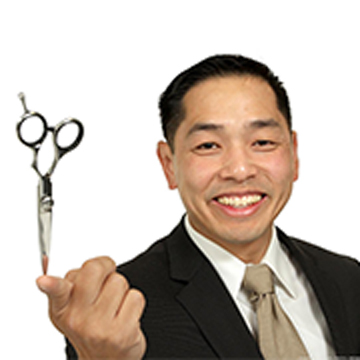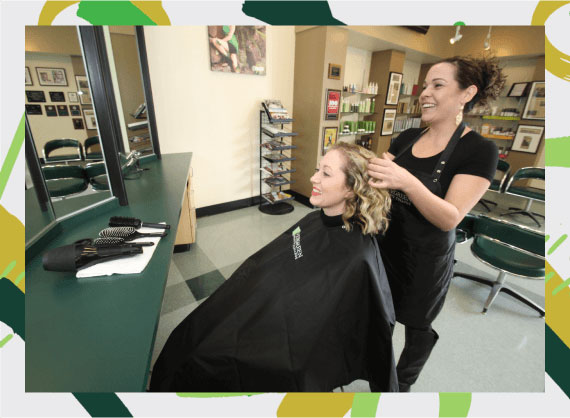Is There a Difference Between a Cosmetologist and Esthetician?

Yistocking – stock.adobe.com
In this article, we’ll discuss the fundamental differences between being a “cosmetologist” and an “esthetician.” While cosmetology and esthetics have many similar traits, they are two separate fields of practice. Here’s what you need to know about these two titles and what students can expect to learn in each curriculum.
What are the main differences between the two fields?
Cosmetology and esthetics, in most areas, are distinctly different, with a bit of overlap between the two studies due to their association and intrigue revolving around grooming and beauty treatments.
Cosmetology
Cosmetology has various studies focusing on hair, skin, and nails. Cosmetologists can provide a wide variety of cosmetology services in all three areas, or they may choose to only offer specialized services in one of the three. Beauty services that cosmetologists may provide include:
Hair coloring & hair care
- Hair styling & hair cutting
- Hair texturing and relaxing
- Nail application, nail art, and nail care
- Basic waxing & and other hair removal services
- Facial treatments, facial massage, and skincare treatments
- Eyelash Extensions
- Salon management
Not all cosmetologists provide all of these services, but typically, going through a cosmetology program will at least give them at least enough understanding and adeptness necessary to execute any of these skills on real clients.
Esthetics
To pursue a beauty career in esthetics, students need a comprehensive grounding that focuses exclusively on skin analysis and skincare––this will ultimately promote clients’ skin’s beauty. Some key differences between cosmetology and esthetics are that estheticians’ specialization is treating skin.
Esthetics involves a specialized approach to wellness and skincare. If you have training exclusively in esthetics, you won’t be qualified to color hair, style hair, cut hair, perform pedicures, or apply chemical hair treatments on clients.
Indeed, they don’t offer various beauty services like cosmetologists do. But even if they don’t have the luxury of providing the same cosmetology services, estheticians can still offer a range of skincare-related services that include:
- Waxing
- Makeup application
- Lash Extensions
- Microdermabrasion
- Permanent makeup
- Electrolysis
- Massage and reflexology
While some of these specializations might need additional training, some are things you learn as part of your esthetics training. Cosmetologists can also become estheticians if they undergo further education.
What are the accreditation state differences?
Accreditation can look different from state to state in esthetics and cosmetology. Before you begin your beauty industry career, attending a cosmetology or esthetics program in the state you plan to practice is wise. Training requirements and licensure requirements vary to some degree in each state.
If you plan to relocate after graduation and pass your state licensing exam, research to learn if you can easily transfer your license to your new residence or if you need to take additional classes.
The education requirements in New York require aspiring cosmetologists to have a 1,000-hour approved course of study. By contrast, Florida requires a 1200-hour approved cosmetology program. Each state may have different curriculums in esthetics, too. Students must take 600 hours of training to earn esthetic licenses in California. Yet, in Florida, an esthetician program only requires 260 hours of training to graduate before students can earn esthetics licenses.
Since hours of education change depending on your residence, it’s good to consider this before relocating––this applies to cosmetology students, too.

hedgehog94 – stock.adobe.com
Which field in beauty provides a better career?
Which beauty field provides a better career overall and has more of an edge? It all comes down to what you’re most interested and passionate about. Both esthetics and cosmetology greatly benefit many people, and your choice in training will typically have to do with the things you love to do.
Professionally administering skin care treatments, hair styling, and cuts are in high demand. Licensed estheticians can work in different settings and can also become medical estheticians.
Having a cosmetology license expands the variety of services you’re legally allowed to provide, making growing a significant customer base easier when you’re just starting.
Estheticians can also expand their skills to encompass beauty professions, like:
- Lash extension technician
- Spa owner
- Esthetics instructor
Esthetics and cosmetology both offer many opportunities for career growth. Rather than working in a salon or spa, these beauty professionals can work as freelancers traveling from port to port on cruise lines. If students have ambitions to work in the entertainment and fashion industry, the competition is more fierce, but a career is certainly feasible.
“If you want to master something, teach it.”
Are you the type of student wanting additional training in your field of study to master the skill? Apart from gaining a deeper understanding of esthetics and cosmetology, students can train how to become an educator. Evergreen Beauty College also offers instructor training.
The instructor course covers different disciplines and the skills needed for developing lesson plans, various teaching methodologies, classroom management, problem-solving, and maintaining a high level of sanitation in the classroom and school salon. Keeping a clean station will not only help instruct students on making clients feel safe and retaining clients, but it will also represent each esthetician, nail tech, barber, and stylist as a true professional.
Find out the right field for you at Evergreen Beauty College
Evergreen Beauty College is a great place to start if you’re considering entering the field of esthetics, cosmetology, barbering, nail technology, and instructor training.
If the field of cosmetology or esthetics feels like a calling, schedule a tour today to learn more about which program is best for you.
FAQ About What’s the Difference Between a Cosmetologist and an Esthetician
What is the difference between a beautician, a cosmetologist, and an Esthetician?
A beautician is a beauty and a technician combined. The word conjures an image of a beauty specialist expelling blemishes, acne, wrinkles, or bad hair days––the transformation a beautician helps create leaves the customer more radiant and beautiful than before. While both beauticians and cosmetologists sound synonymous, a cosmetologist has more extensive training in various beauty fields and a certified license to work as a cosmetologist in their state.
While a cosmetologist does train in administering facials, skin treatments, and massages, estheticians have a concentration in skincare and a deeper understanding of how to examine skin issues and how to treat them.
What is the work of a cosmetologist?
A cosmetologist is well-versed in makeup application, hair styling, cutting, nail treatments, and removal. Typically, a cosmetologist will choose a specialty and focus on that specialty throughout their career, but they are open to more than one profession in the beauty industry.
A cosmetologist can choose from the following professions:
- Salon owner
- Hair Stylist
- Nail technician
- Makeup artist
Why is it called cosmetology?
Cosmo, as in cosmetology, comes from the Greek word Kosmos meaning arrangement or adornment. According to the Merriam-Webster dictionary, it is the cosmetic treatment of the skin, hair, and nails. An alternative etymology of the word, first recorded in 1926, was in French–– cosmétologie, from cosmétique (cosmetic) plus ologie.





I like how you mentioned that cosmetology develops on hair, skin, and nails. My sister told me that she wanted to develop in a career and she was looking for career options. I’m going to suggest her taking cosmetology classes to help her develop different types of ways to make money.
Master Cosmetology license gives you permission to operate in a beauty facility servicing clients hair, skin, and nails in the guideline of the State Board of Cosmetology in the state where you reside.
The Master Cosmetology License will not make you an expert in any area. You will need to further your education and develop your skills by attending continious education in the area of interest.
It takes years of practice and investment of time and money to become a specialist or professional in an area of study but the field is not limited. There are many areas of cosmetology a Master Cosmetologist may venture into.. Hair Color Specialist, Hair Extension Specialist, Skincare Specialist, Nail Specialist, Hair cutter, bridal hair, makeup artist, beauty product and equipment, back stage artist, platform artist, distributor, beauty blogger and more.
The more education and experience the more money a cosmetologist can earn.
Where is this school?
Cosmetology is the broad term. Estheticians, Hairstylists, Nail Technicians, and in some states, Barbers are all recognized as Cosmetologists in many states.
Is it different in yours?
It really depends on the state. I am a Cosmetologist in NH. I am allowed to do hair, skin, and nails. I do hair, and I give facials all the time, I can do manicures and pedicures as well. An esthetician in NH is allowed to do skin and nails, but not hair. A nail tech in NH is allowed to do only nails. If you want a lot of options, Cosmetologist is the way to go, because you can do it all.
A Master Cosmetologist and a Cosmetologist are two different titles. A Master Cosmetologist cares for hair, skin, and nails. A Cosmetologist only works on hair and nails. They both can specialize in one of the trained skills within their job description or offer all that is allowed within their job description.
Master Cosmetologist can do the work of an Esthetician in some salons but the Cosmetologist cannot work on skin.